
AMD Ryzen 5 7600 Benchmark, Test and specs
Last updated:
The AMD Ryzen 5 7600 is a 6 core processor. It can handle 12 threads simultaneously and was introduced in Q1/2023. The AMD Ryzen 5 7600 is based on the 6. generation of the AMD Ryzen 5 series and requires a mainboard with the socket AM5 (LGA 1718). The AMD Ryzen 5 7600 scores 2,049 points with one CPU core in the Geekbench 5 benchmark. When using all CPU cores, the result is 11,147 points.
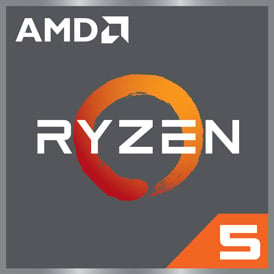
| Name: | AMD Ryzen 5 7600 |
|---|---|
| Family: | AMD Ryzen 5 (84) |
| CPU group: | AMD Ryzen 7000 (14) |
| Architecture: | Raphael (Zen 4) |
| Segment: | Desktop / Server |
| Generation: | 6 |
| Predecessor: | AMD Ryzen 5 5600 |
| Successor: | -- |
CPU Cores and Base Frequency
The 6 CPU cores of the AMD Ryzen 5 7600 clock with 3.80 GHz (5.10 GHz). The number of CPU cores and the clock frequency of the processor are largely responsible for the overall performance.
| CPU Cores / Threads: | 6 / 12 |
|---|---|
| Core architecture: | normal |
| Cores: | 6x Zen 4 |
| Hyperthreading / SMT: | Yes |
|---|---|
| Overclocking: | Yes |
| Frequency: | 3.80 GHz |
| Turbo Frequency (1 Core): | 5.10 GHz |
| Turbo Frequency (6 Cores): | 4.50 GHz |
Internal Graphics
With the AMD Radeon Graphics (Raphael), the AMD Ryzen 5 7600 has an build in graphic solution. It has 2 SM processors, which have a total of 128 texture shaders. The iGPU not only enables games, but also significantly accelerates video playback.
| GPU name: | AMD Radeon Graphics (Raphael) |
|---|---|
| GPU frequency: | 0.40 GHz |
| GPU (Turbo): | 2.20 GHz |
| Compute units: | 2 |
| Shader: | 128 |
| Hardware Raytracing: | No |
| Release date: | Q3/2022 |
| Max. displays: | 3 |
|---|---|
| Generation: | 9 |
| Direct X: | 12 |
| Technology: | 5 nm |
| Max. GPU Memory: | 8 GB |
| Frame Generation: | No |
Hardware codec support
Processors that have an integrated graphics can play videos faster and more efficiently. This can have a positive effect on the battery life of notebooks, for example.
| h265 / HEVC (8 bit): | Decode / Encode |
|---|---|
| h265 / HEVC (10 bit): | Decode / Encode |
| h264: | Decode / Encode |
| VP8: | Decode / Encode |
| VP9: | Decode / Encode |
| AV1: | No |
|---|---|
| AVC: | Decode / Encode |
| VC-1: | Decode |
| JPEG: | Decode / Encode |
Memory & PCIeThe AMD Ryzen 5 7600 supports up to 128 GB memory in up to 2 (Dual Channel) memory channels. This results in a maximum memory bandwidth of 83.2 GB/s. |
|
| Memory type: | Memory bandwidth: |
|---|---|
| DDR5-5200 | 83.2 GB/s |
| Max. Memory: | 128 GB |
| Memory channels: | 2 (Dual Channel) |
| ECC: | Yes |
| PCIe: | 5.0 x 24 |
| PCIe Bandwidth: | 94.5 GB/s |
Thermal ManagementWith the TDP, the processor manufacturer specifies the cooling solution required for the processor. The AMD Ryzen 5 7600 has a TDP of 65 W. |
|
|---|---|
| TDP (PL1 / PBP): | 65 W |
| TDP (PL2): | 88 W |
| TDP up: | 142 W |
| TDP down: | -- |
| Tjunction max.: | 95 °C |
Technical details
The AMD Ryzen 5 7600 has a 38.00 MB large cache. The processor is manufactured in 5 nm. Modern production increases the efficiency of the processor.
| Technology: | 5 nm |
|---|---|
| Chip design: | Chiplet |
| Socket: | AM5 (LGA 1718) |
| L2-Cache: | 6.00 MB |
| L3-Cache: | 32.00 MB |
| AES-NI: | Yes |
| Operating systems: | Windows 10, Windows 11, Linux |
| Virtualization: | AMD-V, SVM |
|---|---|
| Instruction set (ISA): | x86-64 (64 bit) |
| ISA extensions: | SSE4a, SSE4.1, SSE4.2,FMA3, AVX2, AVX512 |
| Release date: | Q1/2023 |
| Release price: | -- |
| Part Number: | -- |
| Documents: | Technical data sheet |
Rate this processor
Benchmark results

The benchmark results for the AMD Ryzen 5 7600 have been carefully checked by us. We only publish benchmark results that have been created by us or that have been submitted by a visitor and then checked by a team member. All results are based on and fullfill our benchmark guidelines.
Screenshots:
Screenshots:
Cinebench 2024 (Single-Core)
The Cinebench 2024 benchmark is based on the Redshift rendering engine, which is also used in Maxon's 3D program Cinema 4D. The benchmark runs are each 10 minutes long to test whether the processor is limited by its heat generation.

|
AMD Ryzen 3 8300G
4C 8T @ 4.90 GHz |
||

|
AMD Ryzen 3 PRO 8300G
4C 8T @ 4.90 GHz |
||

|
Intel Core i5-12500
6C 12T @ 4.60 GHz |
||
|
|
AMD Ryzen 5 7600
6C 12T @ 5.10 GHz |
||

|
AMD Ryzen 5 PRO 7645
6C 12T @ 5.10 GHz |
||

|
AMD Ryzen 7 5800X3D
8C 16T @ 4.50 GHz |
||

|
AMD Ryzen 9 5950X
16C 32T @ 4.90 GHz |
||
Cinebench 2024 (Multi-Core)
The Multi-Core test of the Cinebench 2024 benchmark uses all cpu cores to render using the Redshift rendering engine, which is also used in Maxons Cinema 4D. The benchmark run is 10 minutes long to test whether the processor is limited by its heat generation.

|
Apple M3 Pro (11-CPU 14-GPU)
11C 11T @ 4.06 GHz |
||
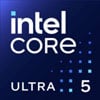
|
Intel Core Ultra 5 125H
14C 18T @ 4.50 GHz |
||

|
Intel Core i5-13400F
10C 16T @ 4.60 GHz |
||
|
|
AMD Ryzen 5 7600
6C 12T @ 5.10 GHz |
||

|
AMD Ryzen 5 PRO 7645
6C 12T @ 5.10 GHz |
||

|
AMD Ryzen 7 5800X3D
8C 16T @ 4.50 GHz |
||

|
Intel Core i7-13700H
14C 20T @ 5.00 GHz |
||
Cinebench R23 (Single-Core)
Cinebench R23 is the successor of Cinebench R20 and is also based on the Cinema 4 Suite. Cinema 4 is a worldwide used software to create 3D forms. The single-core test only uses one CPU core, the amount of cores or hyperthreading ability doesn't count.

|
Intel Core i7-13650HX
14C 20T @ 4.90 GHz |
||

|
Intel Core i5-13490F
10C 16T @ 4.80 GHz |
||

|
Intel Core i7-1365U
10C 12T @ 5.20 GHz |
||
|
|
AMD Ryzen 5 7600
6C 12T @ 5.10 GHz |
||

|
AMD Ryzen 5 PRO 7645
6C 12T @ 5.10 GHz |
||

|
Intel Core i9-12900T
16C 24T @ 4.90 GHz |
||

|
AMD Ryzen 9 7940HX
16C 32T @ 5.20 GHzNot verified |
||
Cinebench R23 (Multi-Core)
Cinebench R23 is the successor of Cinebench R20 and is also based on the Cinema 4 Suite. Cinema 4 is a worldwide used software to create 3D forms. The multi-core test involves all CPU cores and taks a big advantage of hyperthreading.

|
AMD Ryzen 9 6900HX
8C 16T @ 4.20 GHz |
||

|
AMD Ryzen 9 PRO 6950H
8C 16T @ 4.20 GHz |
||

|
AMD Ryzen 9 PRO 6950HS
8C 16T @ 4.20 GHz |
||
|
|
AMD Ryzen 5 7600
6C 12T @ 4.50 GHz |
||

|
AMD Ryzen 5 PRO 7645
6C 12T @ 4.50 GHz |
||

|
AMD Ryzen 7 PRO 6860Z
8C 16T @ 2.70 GHz |
||

|
AMD Ryzen 7 PRO 5750G
8C 16T @ 4.20 GHz |
||
Geekbench 5, 64bit (Single-Core)
Geekbench 5 is a cross plattform benchmark that heavily uses the systems memory. A fast memory will push the result a lot. The single-core test only uses one CPU core, the amount of cores or hyperthreading ability doesn't count.

|
Intel Core i7-13700K
16C 24T @ 5.40 GHz |
||

|
Intel Core i9-13900HX
24C 32T @ 5.40 GHz |
||

|
AMD Ryzen 9 7845HX
12C 24T @ 5.20 GHz |
||
|
|
AMD Ryzen 5 7600
6C 12T @ 5.10 GHz |
||

|
AMD Ryzen 5 PRO 7645
6C 12T @ 5.10 GHz |
||

|
Intel Core i9-13900E
24C 32T @ 5.20 GHz |
||

|
Intel Core i9-13900T
24C 32T @ 5.30 GHz |
||
Geekbench 5, 64bit (Multi-Core)
Geekbench 5 is a cross plattform benchmark that heavily uses the systems memory. A fast memory will push the result a lot. The multi-core test involves all CPU cores and taks a big advantage of hyperthreading.

|
Intel Xeon W-2155
10C 20T @ 4.00 GHz |
||

|
Intel Core i5-13490F
10C 16T @ 4.20 GHz |
||

|
AMD EPYC 7272
12C 24T @ 3.10 GHz |
||
|
|
AMD Ryzen 5 7600
6C 12T @ 4.50 GHz |
||

|
AMD Ryzen 5 PRO 7645
6C 12T @ 4.50 GHz |
||

|
Intel Xeon E5-2698 v3
16C 32T @ 3.00 GHz |
||

|
Intel Xeon E5-2690 v4
14C 28T @ 3.00 GHz |
||
Geekbench 6 (Single-Core)
Geekbench 6 is a benchmark for modern computers, notebooks and smartphones. What is new is an optimized utilization of newer CPU architectures, e.g. based on the big.LITTLE concept and combining CPU cores of different sizes. The single-core benchmark only evaluates the performance of the fastest CPU core, the number of CPU cores in a processor is irrelevant here.

|
Apple M2 Max (38-GPU)
12C 12T @ 3.50 GHz |
||

|
Apple M2 Pro (12-CPU 19-GPU)
12C 12T @ 3.50 GHz |
||

|
AMD Ryzen 5 8500G
6C 12T @ 5.00 GHz |
||
|
|
AMD Ryzen 5 7600
6C 12T @ 5.10 GHz |
||

|
AMD Ryzen 5 PRO 7645
6C 12T @ 5.10 GHz |
||
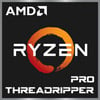
|
AMD Ryzen Threadripper PRO 7955WX
16C 32T @ 5.30 GHz |
||

|
AMD Ryzen Threadripper PRO 7975WX
32C 64T @ 5.30 GHz |
||
Geekbench 6 (Multi-Core)
Geekbench 6 is a benchmark for modern computers, notebooks and smartphones. What is new is an optimized utilization of newer CPU architectures, e.g. based on the big.LITTLE concept and combining CPU cores of different sizes. The multi-core benchmark evaluates the performance of all of the processor's CPU cores. Virtual thread improvements such as AMD SMT or Intel's Hyper-Threading have a positive impact on the benchmark result.

|
Apple M2 Pro (10-CPU 16-GPU)
10C 10T @ 3.50 GHz |
||

|
Intel Core i5-12600K
10C 16T @ 4.50 GHz |
||

|
Intel Core i5-12600KF
10C 16T @ 4.50 GHz |
||
|
|
AMD Ryzen 5 7600
6C 12T @ 4.50 GHz |
||

|
AMD Ryzen 5 PRO 7645
6C 12T @ 4.50 GHz |
||

|
Intel Core i9-12900HK
14C 20T @ 3.80 GHz |
||

|
Intel Core i9-12900H
14C 20T @ 3.80 GHz |
||
Cinebench R20 (Single-Core)
Cinebench R20 is the successor of Cinebench R15 and is also based on the Cinema 4 Suite. Cinema 4 is a worldwide used software to create 3D forms. The single-core test only uses one CPU core, the amount of cores or hyperthreading ability doesn't count.

|
Intel Core i9-12900H
14C 20T @ 5.00 GHz |
||

|
Intel Core i7-11700B
8C 16T @ 5.30 GHz |
||

|
Intel Core i5-13500
14C 20T @ 4.80 GHz |
||
|
|
AMD Ryzen 5 7600
6C 12T @ 5.10 GHz |
||

|
AMD Ryzen 5 PRO 7645
6C 12T @ 5.10 GHz |
||

|
Intel Core i9-12900HK
14C 20T @ 5.00 GHz |
||

|
AMD Ryzen 5 7500F
6C 12T @ 5.00 GHz |
||
Cinebench R20 (Multi-Core)
Cinebench R20 is the successor of Cinebench R15 and is also based on the Cinema 4 Suite. Cinema 4 is a worldwide used software to create 3D forms. The multi-core test involves all CPU cores and taks a big advantage of hyperthreading.

|
Intel Core i9-10900F
10C 20T @ 4.60 GHz |
||

|
Intel Core i9-9940X
14C 28T @ 4.20 GHz |
||

|
Intel Core i9-11980HK
8C 16T @ 4.00 GHz |
||
|
|
AMD Ryzen 5 7600
6C 12T @ 4.50 GHz |
||

|
AMD Ryzen 5 PRO 7645
6C 12T @ 4.50 GHz |
||

|
AMD Ryzen Threadripper 2920X
12C 24T @ 3.60 GHz |
||

|
AMD Ryzen 7 5800X3D
8C 16T @ 4.20 GHz |
||
iGPU - FP32 Performance (Single-precision GFLOPS)
The theoretical computing performance of the internal graphics unit of the processor with simple accuracy (32 bit) in GFLOPS. GFLOPS indicates how many billion floating point operations the iGPU can perform per second.

|
Apple A12 Bionic
Apple A12 @ 1.13 GHz |
||

|
MediaTek Dimensity 820
ARM Mali-G57 MP5 @ 0.90 GHz |
||

|
Qualcomm Snapdragon 835
Qualcomm Adreno 540 @ 0.71 GHz |
||
|
|
AMD Ryzen 5 7600
AMD Radeon Graphics (Raphael) @ 2.20 GHz |
||

|
AMD Ryzen 5 PRO 7645
AMD Radeon Graphics (Raphael) @ 2.20 GHz |
||

|
AMD Ryzen 7 PRO 7745
AMD Radeon Graphics (Raphael) @ 2.20 GHz |
||
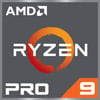
|
AMD Ryzen 9 PRO 7945
AMD Radeon Graphics (Raphael) @ 2.20 GHz |
||
Estimated results for PassMark CPU Mark
Some of the CPUs listed below have been benchmarked by CPU-monkey. However the majority of CPUs have not been tested and the results have been estimated by a CPU-monkey’s secret proprietary formula. As such they do not accurately reflect the actual Passmark CPU mark values and are not endorsed by PassMark Software Pty Ltd.

|
AMD Ryzen 7 5800X
8C 16T @ 4.40 GHz |
||

|
Intel Xeon W-2275
14C 28T @ 4.00 GHz |
||

|
Intel Core i9-10940X
14C 28T @ 4.20 GHz |
||
|
|
AMD Ryzen 5 7600
6C 12T @ 4.50 GHz |
||

|
AMD Ryzen 5 PRO 7645
6C 12T @ 4.50 GHz |
||
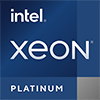
|
Intel Xeon Platinum 8160
24C 48T @ 2.60 GHz |
||

|
Intel Core i5-12600KF
10C 16T @ 4.50 GHz |
||
CPU performance per watt (efficiency)
Efficiency of the processor under full load in the Cinebench R23 (multi-core) benchmark. The benchmark result is divided by the average energy required (CPU package power in watts). The higher the value, the more efficient the CPU is under full load.

|
AMD Ryzen 9 5950X
28,577 CB R23 MC @ 153 W |
||

|
Intel Processor N95
2,724 CB R23 MC @ 15 W |
||

|
Intel Core i5-13500H
15,116 CB R23 MC @ 84 W |
||
|
|
AMD Ryzen 5 7600
14,540 CB R23 MC @ 83 W |
||

|
Intel Core i5-13400F
15,890 CB R23 MC @ 94 W |
||

|
Intel Core i5-13400
15,890 CB R23 MC @ 94 W |
||

|
AMD Ryzen 9 5900X
21,878 CB R23 MC @ 131 W |
||
Benchmarks

Cinebench 2024 (SC)
272 entries
272 entries

Cinebench 2024 (MC)
271 entries
271 entries

Cinebench R23 (SC)
586 entries
586 entries

Cinebench R23 (MC)
565 entries
565 entries

Geekbench 5 (SC)
2,488 entries
2,488 entries

Geekbench 5 (MC)
2,461 entries
2,461 entries

Geekbench 6 (SC)
1,754 entries
1,754 entries

Geekbench 6 (MC)
1,702 entries
1,702 entries

Cinebench R20 (SC)
656 entries
656 entries

Cinebench R20 (MC)
604 entries
604 entries

FP32 SP (iGPU)
2,026 entries
2,026 entries

3DMark Timespy (iGPU)
512 entries
512 entries

PassMark CPU-Mark
2,391 entries
2,391 entries

CPU performance per watt (efficiency)
109 entries
109 entries
Description of the processor
The AMD Ryzen 5 7600 is a 6-core desktop processor from AMD. AMD presented the Ryzen 7000 desktop processors at the end of 2022 and thus also announced the new AM5 socket as a replacement for the AM4 socket, which had been used for many years.With its new AMD Ryzen 7000 processors, AMD still relies on a normal core layout of cores of the same size, while the competition (Apple, Intel) have been using the so-called hybrid big.LITTLE concept for two or more years. Larger and stronger CPU cores are combined with small and more economical cores.
Nevertheless, the performance of the new AMD processors is good and the AMD Ryzen 5 7600 is no exception in its segment. The processor can clock its 6 CPU cores at 3.8 GHz, and even higher clock frequencies of up to 5.1 GHz are possible in turbo mode.
Since the Ryzen 7000 generation, AMDs desktop processors have also had an integrated graphics unit, also known as iGPU. Although this is not particularly powerful, it is sufficient to use the computer for light work. Browsing the Internet and playing videos, even with modern video codecs, is also possible without any problems.
The AMD Ryzen 5 7600 supports up to 128 GB of memory. A maximum of DDR5-5200 is mentioned, but we know from various test reports that faster main memory usually also works without problems. The so-called "sweet spot" is said to be DDR5-6000. In dual channel mode, the AMD Ryzen 5 7600 achieves a bandwidth of 83 GB/s when using DDR5-5200 memory.
A graphics card can be connected via PCIe 5.0 with 16 PCIe lines, a total of 24 PCIe 5.0 lines are available. However, the PCIe connection also depends on the chipset of the mainboard. The TDP of the AMD Ryzen 5 7600 is 65 watts, although the processor can also use more energy under full load.
Popular comparisons
back to index




